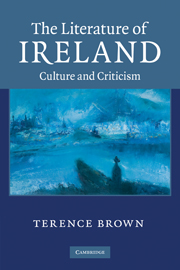Book contents
- Frontmatter
- Contents
- Acknowledgements
- Introduction
- 1 The Literary Revival: historical perspectives
- 2 Joyce's magic lantern
- 3 Music: the cultural issue
- 4 Modernism and revolution: rereading Yeats's ‘Easter 1916’
- 5 Shakespeare and the Irish self
- 6 Irish literature and the Great War
- 7 Ireland, Modernism and the 1930s
- 8 Post-modernists: Samuel Beckett and Flann O'Brien
- 9 Patrick Kavanagh: religious poet
- 10 MacNeice's Irelands: MacNeice's islands
- 11 Louis MacNeice and the Second World War
- 12 MacNeice and the puritan tradition
- 13 John Hewitt and memory: a reflection
- 14 Michael Longley and the Irish poetic tradition
- 15 Seamus Heaney: the witnessing eye and the speaking tongue
- 16 Derek Mahon: the poet and painting
- 17 Telling tales: Kennelly's Cromwell and Muldoon's ‘The More a Man Has the More a Man Wants’
- 18 Redeeming the time: John McGahern and John Banville
- 19 ‘Have we a context?’: transition, self and society in the theatre of Brian Friel
- 20 Hubert Butler and nationalism
- 21 The Irish Dylan Thomas: versions and influences
- Index
- References
11 - Louis MacNeice and the Second World War
Published online by Cambridge University Press: 05 June 2012
- Frontmatter
- Contents
- Acknowledgements
- Introduction
- 1 The Literary Revival: historical perspectives
- 2 Joyce's magic lantern
- 3 Music: the cultural issue
- 4 Modernism and revolution: rereading Yeats's ‘Easter 1916’
- 5 Shakespeare and the Irish self
- 6 Irish literature and the Great War
- 7 Ireland, Modernism and the 1930s
- 8 Post-modernists: Samuel Beckett and Flann O'Brien
- 9 Patrick Kavanagh: religious poet
- 10 MacNeice's Irelands: MacNeice's islands
- 11 Louis MacNeice and the Second World War
- 12 MacNeice and the puritan tradition
- 13 John Hewitt and memory: a reflection
- 14 Michael Longley and the Irish poetic tradition
- 15 Seamus Heaney: the witnessing eye and the speaking tongue
- 16 Derek Mahon: the poet and painting
- 17 Telling tales: Kennelly's Cromwell and Muldoon's ‘The More a Man Has the More a Man Wants’
- 18 Redeeming the time: John McGahern and John Banville
- 19 ‘Have we a context?’: transition, self and society in the theatre of Brian Friel
- 20 Hubert Butler and nationalism
- 21 The Irish Dylan Thomas: versions and influences
- Index
- References
Summary
For Louis MacNeice, as for so many, 1939 was a year of journeyings. Hitler's invasion of the Sudetenland and the feeble response of the international community, as well as the involvement of the great powers in the Spanish Civil War and the horrors of Kristalnacht, had alerted the world to the imminence of a major conflagration in Europe. So last holidays abroad were enjoyed before once again the lights would go out all over the Continent, and hurried exiles were arranged as individuals and families sought sanctuary in regions and countries which might escape the nightmare to come. Urgent messages were carried from country to country in the hope that the disaster might be averted. It was, in Cyril Connolly's words, ‘Closing time in the gardens of the west’. For many writers, accustomed to easy travel in a decade in which air as well as railway transport had made the crossing of international borders a natural thing, the prospect of being unable to enjoy such freedom was a fact which began to concentrate their minds in precise ways. Ezra Pound travelled in 1939 to his native United States in a vain attempt to influence governmental economic policy but chose to return to Italy to the tragic fate which awaited him there. Francis Stuart would wait a year before, in 1940, his dark angel would take him to Berlin and a complicity with the regime there that none of his subsequent writings nor the special pleadings of his apologists have quite been able to expunge.
- Type
- Chapter
- Information
- The Literature of IrelandCulture and Criticism, pp. 142 - 155Publisher: Cambridge University PressPrint publication year: 2010



